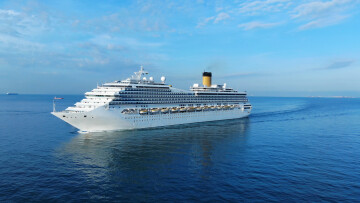Artificial Intelligence supports future maritime simulator education and training
Hamburg / Turku, 5 October 2022.
Well-trained seafarers are important, as the value creation and safety at sea depends on the seamanship and competence of seafarers. Although many functions onboard of modern vessels have been automated, a ship is still, to a great extent, a human controlled system.
High-quality vocational education is the cornerstone of effective youth transitions into the labour market for the European society. During the pandemic period, the suspension of maritime simulator-based training sessions has led to many challenges with regards to skill development, certification, and competency examination.
How can the effectiveness and accessibility of simulator-based education, safety, security, and performance of maritime operations of the future be improved?
Integrating Adaptive Learning in Maritime Simulator-Based Education and Training with Intelligent Learning System (i-MASTER) is a research and innovation project funded by Horizon Europe, with a budget of 3,286,602 euro during the period 1.9.2022-31.8.2026.
The primary objective of the project is to develop an Intelligent Learning System (ILS) with maritime learning analytics and adaptive learning function for students engaged in both remote and on-site maritime simulator-based education and training.
The i-MASTER Intelligent Learning System contains of 3 innovations
1) Digitalized navigational performance assessment
2) AI-enabled intelligent learning for remote (desktop) ship bridge simulator training
3) AI-enabled intelligent learning for on-site full mission ship bridge simulator training
The Finnish-German/German-Finnish Fraunhofer Innovation Platform for Smart Shipping at Novia University of Applied Sciences (FIP-S2@Novia) is one of the core partners in i-MASTER. FIP-S2@Novia is responsible for the maritime learning analytics development and the implementation and testing phase, thus digitizing maritime education.
The project is coordinated by UiT - The Arctic University of Norway. Together with the further five partners University of Gothenburg (Sweden), TERP AS (Norway), Vienna University of Economics and Business (Austria), University of South-Eastern Norway (Norway) and the Swedish National Road and Transport Research Institute (Sweden) a distinct, complementary consortia is formed covering multidisciplinary knowledge and cross-sectorial experience. This is necessary to achieve the project objectives and to facilitate innovative, integrated, and emerging technology-enhanced maritime simulator-based education and training.
According to FIP-S2@Novia Director Mirva Salokorpi, the project brings together technological, educational, psychological, and economical expertise with experience in shipping.
“This is our first joint EU project in the framework of the FIP cooperation, and I am very excited about the auspicious
consortium,” she says.
More information
Novia University of Applied Sciences, Mirva Salokorpi, tel. +358 44 762 3532, fip-s2.fi
Fraunhofer CML, Hans-Christoph Burmeister, tel. +49 40 42878 6131, fip-s2.fi
Press release at Fraunhofer CML

